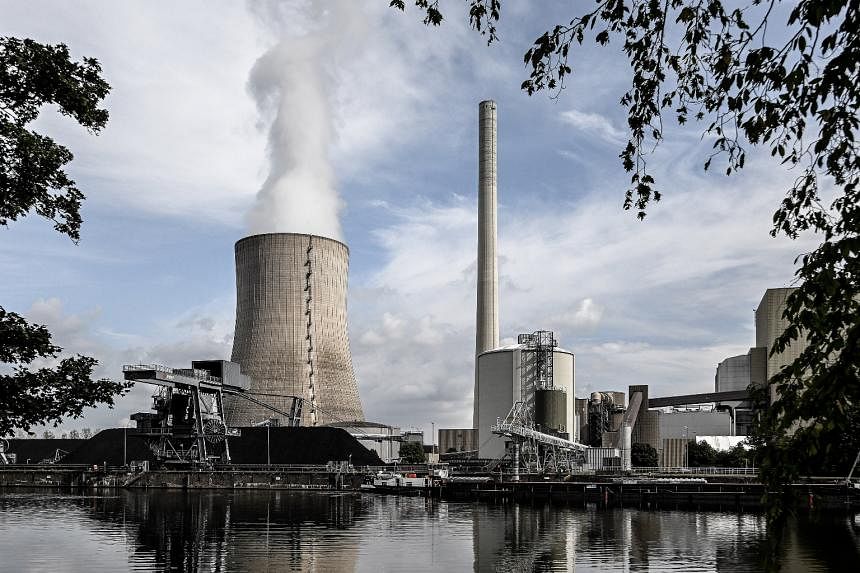BERLIN - Germany will keep two of its three remaining nuclear power plants on reserve in the event they’re needed to make up for a shortfall in electricity generation this winter, reversing a long-planned shutdown of the facilities.
“This way, we can act if worst comes to worst,” Economy Minister Robert Habeck said Monday in an emailed statement, adding that the government remains “committed to the nuclear exit.”
The ruling coalition came under intense pressure to delay the final step in the phaseout of the country’s nuclear facilities after Russia’s invasion of Ukraine triggered a dramatic surge in energy prices.
The situation escalated after Russia’s Gazprom decided not to turn the crucial Nord Stream gas pipeline back on after maintenance, raising the prospect of energy rationing this winter.
Chancellor Olaf Scholz’s government is racing to secure energy supplies for Europe’s biggest economy while dealing with the worsening cost of living crisis.
Scholz and his alliance partners at the weekend unveiled a third package of aid – worth 65 billion euros (S$90.5 billion) – to ease the burden on households and companies.
Finance Minister Christian Lindner, who heads the business-friendly Free Democrats, lobbied for the move. Habeck and Foreign Minister Annalena Baerbock, who are both from the Greens, were much more reluctant given their ideological opposition to atomic energy.
E.ON and Energie Baden-Wuerttemberg have said they’re open to keeping their two plants running, while RWE has been sceptical, citing “significant” legal and technical obstacles.
Nuclear power accounted for 6 per cent of electricity generation in Germany in the first quarter, compared with more than 30 per cent from coal, 13 per cent from gas and almost half from renewables including wind and solar, according to Federal Statistics Office data published in June.
Recent opinion polls suggest broad public support for postponing the nuclear shutdown. Nearly two-thirds back the move, a Forschungsgruppe Wahlen poll for public broadcaster ZDF showed last month.
Habeck and Baerbock have cited France’s recent problems with its reactors as evidence that nuclear energy is unreliable and say it’s not the answer to Europe’s supply woes.
“The fact that some people are now presenting nuclear power as our saviour and as the solution to all problems is also ridiculous,” Habeck said in an interview with Bloomberg on Aug. 28.
Meanwhile, German gas importer Uniper does not rule out Europe's biggest economy will eventually consider gas rationing after Russia stopped flows via its main pipeline to the continent and confirmed it was weighing legal action against Gazprom.
The comments by Uniper CEO Klaus-Dieter Maubach came as European gas prices surged after Russia said the Nord Stream 1 pipeline would stay shut indefinitely due to a fault, in another blow to the European Union as it struggles to recover from the pandemic.
"We cannot rule out that Germany might look at rationing gas as something that might have to be considered," CEO Klaus-Dieter Maubach told Reuters in an interview on the sidelines of an international gas conference in Milan. "We know that the government wants to avoid this as much as possible because that would be a disaster for so many reasons," he added.
The move by Gazprom meant that Germany was unlikely to reach a 95 per cent filling target for its gas storage facilities by Nov 1.
Maubach, whose company is Germany's biggest importer of Russian gas, said that gas demand in northwest Europe had declined by 15-20 per cent against the weather-adjusted normal demand.
Europe has accused Russia of weaponising energy supplies in retaliation for Western sanctions imposed on Moscow over its invasion of Ukraine.
Russia says the West has launched an economic war and sanctions have caused the gas supply problems.
'Political decision'
Uniper, majority-owned by Finland's Fortum, has been hit hard by soaring gas and electricity prices, forcing it to request billions in financial aid from the German government.
Dramatic increases in recent days have exacerbated the situation for the company, prompting it to seek more cash even as the details of last month's bailout deal with Germany's government have yet to be hammered out.
Uniper, which had already fully drawn down a 9 billion-euro (S$12.6 billion) credit line from state lender KfW said an additional 4 billion euros it has recently applied for has been agreed and signed and tranches will be called up according to demand.
He said that Uniper was still considering legal action against Moscow's giant Gazprom to compensate its shareholders for around a 90 per cent drop in the company's market value following a sharp fall in Russian gas supply since June.
He did not elaborate. "The curtailment (of gas flows) was never a technical issue, but a political decision, as such, it will continue to be a political decision," Maubach said at the Gastech conference.
"Whether the flows will increase or decrease I would dare to say this has been decided in the Kremlin and not in Gazprom headquarters," Maubach said.
On his outlook for the coming winter, Maubach said that in the worst case scenario of zero delivery into Germany from Gazprom, "it will be difficult to balance supply and demand" adding that European companies and leaders will need to be open to some kind of market interventions to stabilise energy prices.
Earlier on Monday, Uniper singed a deal with Woodside under which the Australian group will supply liquefied natural gas worth 1 billion cubic metres per year to Europe to help cut the continent's reliance on Russian supplies. BLOOMBERG, REUTERS

